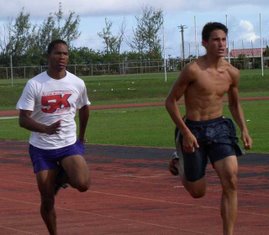 The Greatest Athletic Event
The Greatest Athletic EventWhat is the greatest race...no, the greatest athletic event in the world?
I may be biased but I know that people who love the drama of true distance running will fall in love with this special event.
The Hakone Ekiden
In Japan there's a traditional road race --- a 2-day 134-mile 10-person relay called the Hakone Ekiden. It's been described as "... something akin to the Boston Marathon, the Final Four and the Super Bowl rolled into one. More than a run for the tape, the race encapsulates the perseverance, pathos and unswerving loyalty the Japanese value so highly." Ken Belson of the New York Times (4 Jan 2004)
The runners go all-out in their long relay legs, running with unimaginable pressure and responsibility, then passing on the cloth sashes called tasuki to their teammates. On race day, the runners are endowed with the power of each college's legacy and are even blessed by teams at shrines. In effect, they embody the spirit of the race the Japanese find so appealing.
The Hakone Ekiden has been around for over 80 years and it is not uncommon to see grandparents, who were taken to the race by their grandparents, watching the race and cheering with their grandchildren on the roadside.
The Hakone Ekiden features teams of students from various Japanese universities in the Kanto region. This race from Tokyo to Hakone and back is held over two days at the New Year, and is a popular spectator sport that receives full network television coverage nationwide. Runners in the race compete to set individual records as well as to support their teams, and the race is considered to display many aspects of Japanese culture and spirit, including individual perseverance, identity within a group, and the importance within the Japanese hierarchy of allegiance to a major university.
You can say that one of the reasons Japan has produced so many great marathoners is because of the Hakone race. It is not uncommon for the runners to put in 1000 kilometers a month in training for the long relay legs that are between 20 and 23 kilometers long. Many of the teams that qualify train specifically for Hakone throughout the year. It seems that each year, there is some kind of drama during the event--for example, last year the lead runner for Juntendo University became severely dehydrated and zigzagged his way in a semi-conscious state, determined to pass on the tasuki to his teammate.
If you find yourself in Japan on January 2 and 3, tune in and watch Hakone. I guarantee you won't regret it!
I may be biased but I know that people who love the drama of true distance running will fall in love with this special event.
The Hakone Ekiden
In Japan there's a traditional road race --- a 2-day 134-mile 10-person relay called the Hakone Ekiden. It's been described as "... something akin to the Boston Marathon, the Final Four and the Super Bowl rolled into one. More than a run for the tape, the race encapsulates the perseverance, pathos and unswerving loyalty the Japanese value so highly." Ken Belson of the New York Times (4 Jan 2004)
The runners go all-out in their long relay legs, running with unimaginable pressure and responsibility, then passing on the cloth sashes called tasuki to their teammates. On race day, the runners are endowed with the power of each college's legacy and are even blessed by teams at shrines. In effect, they embody the spirit of the race the Japanese find so appealing.
The Hakone Ekiden has been around for over 80 years and it is not uncommon to see grandparents, who were taken to the race by their grandparents, watching the race and cheering with their grandchildren on the roadside.
The Hakone Ekiden features teams of students from various Japanese universities in the Kanto region. This race from Tokyo to Hakone and back is held over two days at the New Year, and is a popular spectator sport that receives full network television coverage nationwide. Runners in the race compete to set individual records as well as to support their teams, and the race is considered to display many aspects of Japanese culture and spirit, including individual perseverance, identity within a group, and the importance within the Japanese hierarchy of allegiance to a major university.
You can say that one of the reasons Japan has produced so many great marathoners is because of the Hakone race. It is not uncommon for the runners to put in 1000 kilometers a month in training for the long relay legs that are between 20 and 23 kilometers long. Many of the teams that qualify train specifically for Hakone throughout the year. It seems that each year, there is some kind of drama during the event--for example, last year the lead runner for Juntendo University became severely dehydrated and zigzagged his way in a semi-conscious state, determined to pass on the tasuki to his teammate.
If you find yourself in Japan on January 2 and 3, tune in and watch Hakone. I guarantee you won't regret it!

